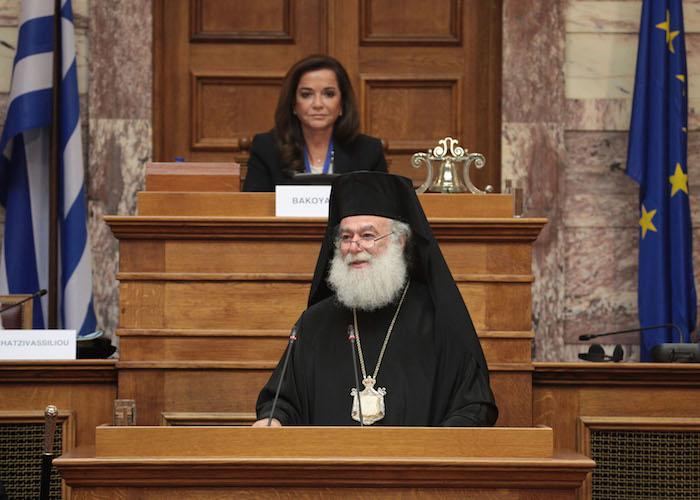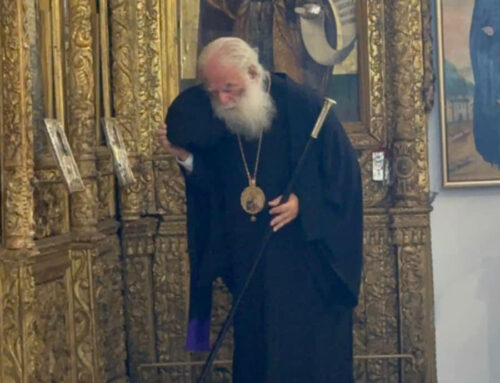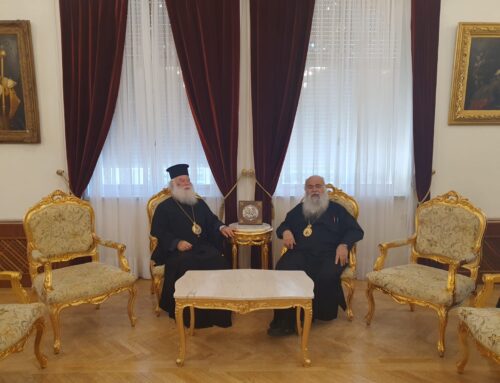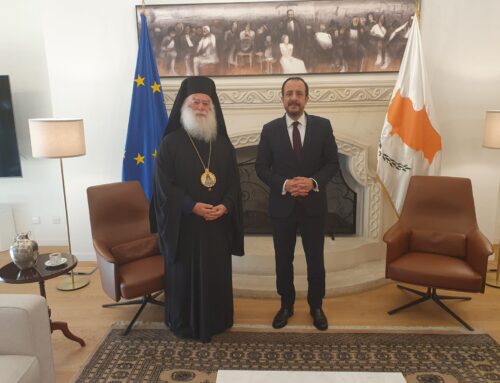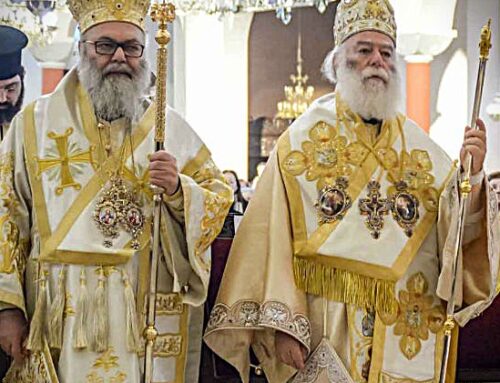On 7th May 2014, His Beatitude Theodoros II, Pope and Patriarch of Alexandria and All Africa addressed the Conference for Religious Freedom and Security of Christian Communities in the Middle East and the Southern Mediterranean, which took place in the Senate Hall of the Greek Parliament. The Conference was convened on the initiative of the head of the Greek Representatives at the Parliamentary Assembly of the European Council, Mrs. Theodora Bakogiannis, within the framework of a Meeting of the Council of Political Affairs and Democracy of the Parliamentary Assembly. Giving his position on the place of Christians in their historic birthplace, His Beatitude emphasized:
I am with you today following the kind invitation of my compatriot and good friend for decades now, Mrs. Theodora Bakogiannis, in order that, as Primate of Orthodoxy in Africa, I can give a rostrum and voice to the Christians of the South of the Mediterranean Sea. I am here today at the temple of Greek Democracy, in order to bring to this older European Organization, the European Council, the anxieties for today, as well as the hopes for tomorrow of the Christians, who in spite of the times and the circumstances remain in the historic birthplace of Christianity.
Two thousand years ago, the Church of Christ was born, was founded and began its activities with the aim of meeting the people of the world and to share with them the demands of life, the meanings and the existential questions of the living world. This meeting was not imposed by external factors, neither was it the result of an historic necessity. It was the product of the universal conscience and of the holy mission of the Church: “the obedience that comes from faith among all the nations for the sake of his name” Jesus Christ (Romans 1:5).
In the course of the two millennia the Christians in the Middle East and in North Africa often found themselves between the rock and the hard place of historic volatility and often experienced the minimum distance which separates life from death. The challenges and difficulties strengthened their conscience and they did not delete the conscience of the responsibility of preserving and spreading the profession of God from their genetic identity “in Christ through the Gospel” (Ephesians 3:2-6).
Two thousand years later, the Church of Christ in the Middle East and in North Africa continues to transmit the timeless and global, multinational and universal message of Christianity. Nevertheless, the conscience of Christians is being tested, as the political and social peace, a core value of all the religious traditions and convictions which blossomed in this area, has been converted from an obvious given to a inaccessible requisite. A requisite which is often lost from before the eyes of mankind, as reconciliation is contravened by the use of violence and hope for tomorrow is nullified by fear.
Religious self-determination, instead of proving itself a peacemaking factor, sometimes becomes a factor of division and intolerance, fanaticism and violence. This occurs when religious conscience is manipulated and religious fundamentalism denies another’s freedom in the name of God. This occurs when religious conscience is conquered by forces of messianism, fundamentalism and ideological exclusivity.
This development can become dangerous, because today, both in the above-mentioned areas as well as globally, there is no human society which does not include people of different cultural roots, with different views regarding the relationships between God and man. This development can become dangerous because today religious self-determination tends to overcome national self-determination as a factor of diversification of human behavior.
Faced with this reality it is essential that it is understood that the way out of the current political, economic and social rigidities is found neither in the radicalization of societies through religious politicization, nor in the tight embrace of political and religious ideologies. Wherever and whenever such things has been pursued in the Middle East and in North Africa, conditions of evaluative classification of citizens was created based on their religious identity, with dire consequences.
In order that politics are not religionized and that religion is not politicized, it is essential to institutionally ensure and to implement practically the priority of the status of citizens against any other status which recommends the constitutive identity of every person; national, religious or political. In order to avoid both the oblivion of the believed truth as well as the fanaticism of the believed truth of each person, it is essential to institutionally ensure and to practically implement not only tolerance against what is different, but real respect of the differences in others.
The Church of Christ places at the head of the motion and ranking of life, that for centuries has been experientially testified to in this geographical area, the life example of its Head. Jesus Christ showed in practice that the meaning of tolerance and of forbearance is not only inadequate, but could also become negative when it harbours a feeling of superiority which humiliates another person, one who is different, one who does not agree with us. He Himself was often faced with the inability of people to understand Him. He Himself often experienced rejection.
He chose a “foreigner”, a Samaritan, to show the necessity of fulfilling the commandment of love towards a neighbour. He extended His hospitality to all, to whoever was in need of compassion. He offered hospitality to all who had been pushed to the margins of society. He showed in practice that acceptance of others is not limited only to the members of our community. On the contrary, he called on us to love even our enemies and to pray for them.
In this effort of teaching a new form of consistency and while the broader area of the south eastern Mediterranean is experiencing sorrows of an historic transformation with implicit results, the European Council can and must exploit its most powerful tools for the promotion of peace, stability, security, development and prosperity in the area. Please allow me to suggest as a beneficial field for passing on experience and know-how from your many years of working for the unity of Europe, the undertaking of developmental activities against poverty. And this is because in the territory of poverty fundamentalism and intolerance are cultivated.
Europe has the historic duty to assist Africa and the Middle East to overcome the incompatibility between the North and South of the Mediterranean Sea and the promotion of the values of the society of citizens amongst which is freedom for each person to have faith and believe whatever he or she wishes, with an inviolable red line being the unfair proselytism. I realize that the path will be long and difficult. However, if we do not traverse it, nothing will change. Let us have as a guide the words of St. Augustine: “Faith is to believe in what you cannot see, the reward is to see that which you believe”.
It is noteworthy that participating in this conference were representatives of the Parliaments of Algeria, Israel, Egypt, Jordan, Lebanon, Morocco, the National Constitutional Assembly of Tunisia and the National Palestinian Council, and greetings were sent by, among others, the President of the Greek Parliament Mr. E. Meimarakis, the Head of the Parliamentary Assembly of European Council Mrs. A. Brasseur and the Minister of Education and Religions Mr. K. Arvanitopoulos.




